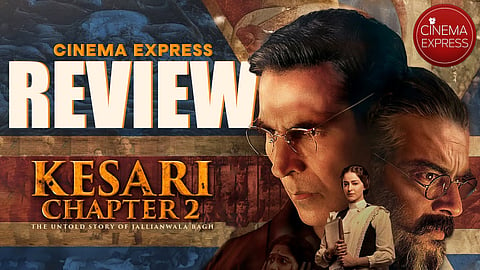Kesari Chapter 2 Movie Review: Akshay Kumar and R Madhavan amp up the theatrics in a court battle that never really happened
Kesari Chapter 2(1.5 / 5)
Great historical dramas dramatise the truth and all its versions. Propagandist history flicks often tell only the side that serves their purpose. Now, we have a third category: the fabricated historical. The mouthful Kesari Chapter 2: The Untold Story of Jallianwala Bagh, starring Akshay Kumar, R Madhavan and Ananya Panday, confuses falsity for creative liberty. This is not just a slight, innocuous tampering of facts which any other Hindi period-drama is guilty of these days. It is also not an ignorable hagiography. The flag-waving film actually centres on a case that was never filed.
Akshay Kumar assertively plays the reel version of C Sankaran Nair, a distinguished lawyer who was part of the Viceroy’s Council in 1915. Akshay’s Nair is a sharp argumentator who can win cases while doing crossword. He is an ally of the Raj, which soon earns him Knighthood from the British. His conscience, however, is rattled in the aftermath of the Jallianwala Bagh Massacre and he decides to take the Crown to court. Accompanying him in this fight for justice is Dilreet Singh (Ananya Panday), a young advocate from Punjab who looks up to him. In the court, Nair faces-off with the sinister defense lawyer Neville McKinley (R Madhavan) who holds a personal grudge against him. And thus begins a tired, tropey legal battle filled with blaring nationalistic sermons and historical inaccuracies.
Kesari Chapter 2 claims to be based on the book The Case That Shook The Empire by Raghu and Pushpa Palat. The text details C Sankaran Nair’s defence against a defamation case filed in London by Michael O’Dwyer, who was the Lieutenant Governor of Punjab at the time of the Jallianwala Bagh tragedy. The case was in response to Nair’s book Gandhi and Anarchy (1922) in which he criticised O’Dwyer for his brutal policies in Punjab that ultimately led to the massacre. Although Nair did quit the Viceroy’s council in protest after the Jallianwala Bagh incident and vocalised his condemnation against the Raj over the act, the cinematic version unnecessarily puffs him to be a tour de force who filed a genocide case against the British in the Amritsar district court. As per historical records, no such case—or any for that matter—was filed against the Crown over the 1919 tragedy. In the film, not Michael O’Dwyer, as per the defamation case, but Colonel Reginald Dyer, the military officer who ordered soldiers to open fire at Jallianwala Bagh, is in the witness box. Maybe the makers mixed up the surnames.
Even if we jettison the facts, Kesari 2 doesn’t have enough propulsion to sweep you up in its narrative. Akshay’s Nair’s only trait seems to be that he is brilliant. Hailing from Kerala, Nair is introduced as a master of both Kalaripayattu and Kathakali but Akshay’s accent doesn’t even bear an attempt at a South Indian tinge. Akshay doesn’t play Nair, he rather plays Akshay Kumar playing Nair. Madhavan, on the other hand, initially shows some potential as a crafty antagonist. The actor plays McKinley with a shrewdness that often feels like an extension of his character in Shaitaan (2024). Ananya Panday’s Dilreet seems to exist in the film only for it to grab some feminism points. “Doesn’t your England have queens?” she retorts when a reporter states that it is surprising to see a woman fight a case in court. Her character arc seems to halt here.
Kesari 2 also offers no surprises. The court arguments are predictable and unimaginative. The incessant questioning of Dyer by Nair leads to an explosive confession and the whole scene feels like a rip-off from A Few Good Men (1992). Akshay drops F-bombs in court but they drew blank in the theatre I caught the film at. Kesari 2 often felt like a greatest-hits version of all courtroom dramas served with an extra topping of chest-thumping nationalism.
Now, I understand that expecting a feature film to serve as a history lesson is an exercise in futility. A chunky disclaimer in the beginning, claiming that the film doesn’t portray itself to be factually accurate, technically does absolve the makers of any responsibility. But from an ethical lens, it sets a dangerous precedent. “I understand, arts don’t run a nation,” a character tells Akshay’s Nair in the film. Hope, it isn’t only the nation that runs the arts.

